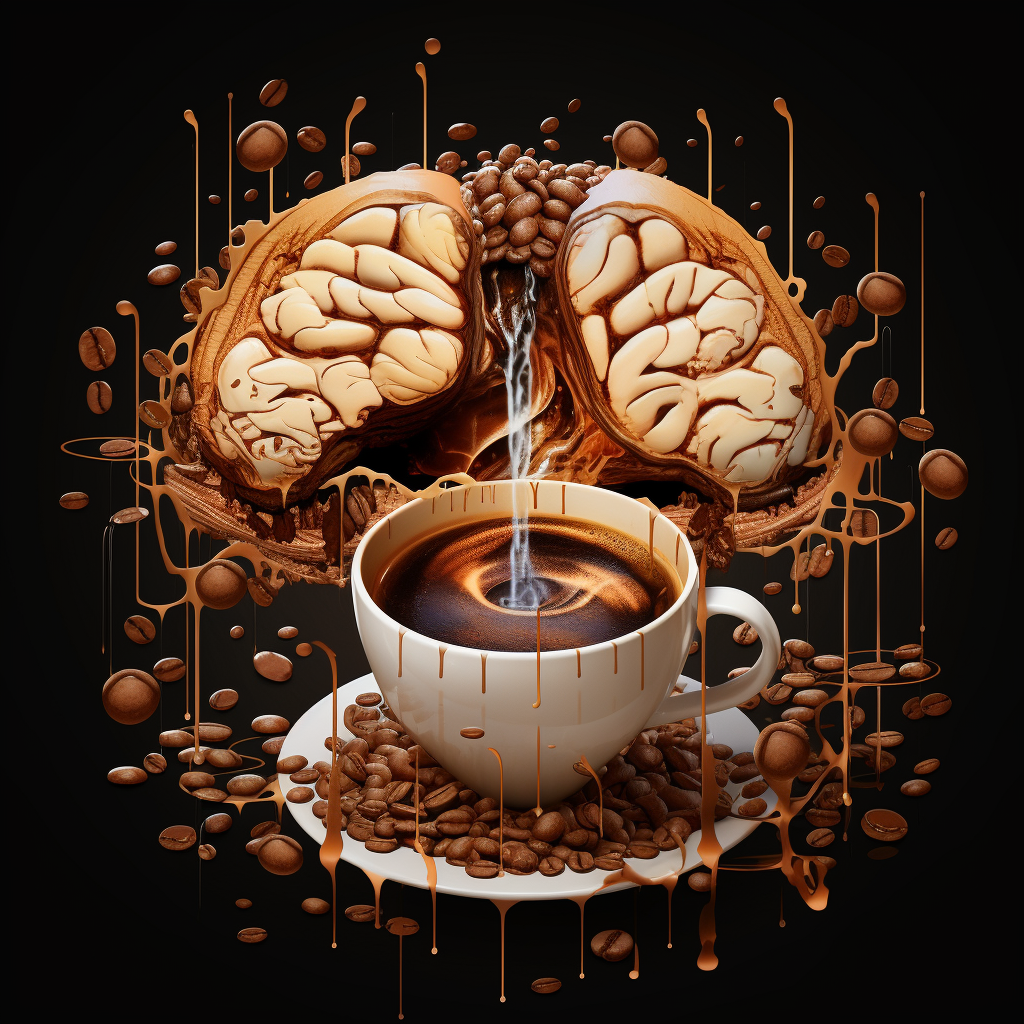Blog
Empower Your Mind: Coffee’s Revolution Against Cognitive Aging
As the population across the globe ages rapidly, diseases related to old age are on the rise. Dementia, Alzheimer’s, and other neurodegenerative diseases threaten to become pervasive health issues, potentially impacting both motor and cognitive abilities in millions of older adults. In the face of this impending crisis, researchers are searching for ways to promote healthy brain aging and fend off age-linked cognitive impairment.
An unexpected ally has emerged in this fight: the morning cup of coffee. Studies are increasingly pointing to coffee as a factor that may help reduce the risks of cognitive decline, dementia, and Alzheimer’s disease later in life. The numbers are eye-opening—for example, one study found that drinking three to five cups of coffee per day in middle age is associated with a whopping 65% lower risk of dementia and Alzheimer’s.
With data like this, scientists are taking a closer look at the potential protective powers of coffee. Caffeine has grabbed much of the spotlight, as coffee’s most well-known active ingredient associated with enhanced cognitive function. But coffee contains a diverse array of other compounds that may also boost neurological health. The possibilities are intriguing. Could a daily habit as simple as drinking coffee hold the key to preserving memory and warding off Alzheimer’s as we age? Let’s dive deeper to explore how coffee may exert its neuroprotective effects and what the latest research reveals about using coffee to promote long-term brain health.
Coffee Components That May Benefit the Aging Brain
Caffeine has gained considerable attention as coffee’s active ingredient that may lower the risk of cognitive decline. The stimulant properties of caffeine may protect against the accumulation of amyloid plaques and support healthy brain aging. However, coffee contains many other compounds that also influence neurological health.
For instance, coffee beans contain antioxidant plant compounds called polyphenols, including chlorogenic acids. Some research indicates that chlorogenic acids may have neuroprotective effects and reduce inflammation in the brain that contributes to cognitive impairment. Coffee beans also contain diterpenes such as cafestol and kahweol which have been studied for their potential anti-inflammatory and antioxidant properties.
In addition, coffee is a source of essential vitamins and minerals that are important for brain health like vitamin B12, niacin, magnesium and potassium. The diverse combination of nutrients and plant chemicals in coffee makes it a complex brew. There are over 1,000 biologically active compounds identified in roasted coffee beans! This complexity makes coffee a promising candidate for protecting brain health.
Other antioxidant-rich plant foods and beverages have also been studied for brain benefits, such as green tea and matcha. Matcha is a type of powdered green tea that contains L-theanine, an amino acid that may support brain health. Check out this post on the cognitive benefits of matcha to learn more about its neuroprotective potential.
How Coffee May Counteract Age-Related Cognitive Deficits
As we grow older, changes occur in the brain that can diminish cognitive skills. Oxidative stress and inflammation in the brain are two factors that contribute significantly to age-related cognitive impairment.
Oxidative stress results from an accumulation of free radical molecules that can damage cells throughout the body and brain. Our natural antioxidant defenses decline with age, leaving the brain more vulnerable to free radical damage over time. This oxidative damage can accelerate degeneration of brain cells, contributing to cognitive deficits.
Neuroinflammation also increases with age, involving activation of immune cells and proteins that can harm neurons and neural connections. Chronic low-grade inflammation in the aging brain is believed to play a central role in cognitive decline and neurodegenerative disease progression.
Fortunately, coffee is rich in compounds that possess antioxidant and anti-inflammatory activity, making it a potent dietary intervention. Caffeine and polyphenols like chlorogenic acids have been shown to increase antioxidant capacity and help neutralize free radicals. Other coffee compounds such as kahweol may turn on genes involved in antioxidant defenses.
By boosting antioxidant status, coffee may prevent the accumulation of oxidative damage that erodes cognitive function. Coffee may also block inflammatory pathways in the brain activated by aging. Researchers have found that caffeine, chlorogenic acids, and other coffee components can reduce activation of pro-inflammatory genes and proteins linked to cognitive impairment.
The powerful combination of antioxidants and anti-inflammatory agents in coffee make it well-suited to counter the twin assaults of oxidation and inflammation on the aging brain. By preserving neuronal integrity and connections, coffee may help sustain cognitive abilities into older age. Let’s now review some of the exciting research demonstrating coffee’s neuroprotective potential.
Overview of Research on Coffee, Caffeine, and Brain Aging
A growing body of research is unraveling how coffee and its bioactive components may help defend the brain against age-related cognitive decline. Both animal and human studies have provided important insights into coffee’s neuroprotective potential.
Several animal studies reveal promising effects of both coffee and isolated caffeine against Alzheimer’s disease pathology and cognitive impairment. A study by Arendash and colleagues found that aged Alzheimer’s mice treated with caffeine equivalent to 5 cups of coffee per day exhibited a complete reversal of memory impairment. Caffeine also reduced build-up of amyloid plaques in the Alzheimer’s mouse brains.
In another murine study, an amino acid called pyroglutamate found in coffee was shown to improve learning and memory retention in both young and aged mice after 10 days of treatment. The coffee compound worked by enhancing synaptic plasticity, which declines with age.
To dig deeper into coffee’s neuroprotective mechanisms, our research team conducted two studies in aged rats. In the first study, we provided aged rats with an extract of whole coffee fruit powder for 4 weeks. The coffee treatment resulted in improved performance on cognitive tasks measuring spatial learning, working memory, and psychomotor function compared to controls.
In another experiment, we isolated just caffeine and administered it to aged rats for 2 months. The caffeine treatment protected neurons in the hippocampus and preserved cognitive function. Caffeine activated antioxidant signaling pathways and increased levels of BDNF, a protein vital for neuronal health.
While animal studies support coffee’s brain benefits, considerable human research also indicates that coffee drinkers may have reduced risks for cognitive impairment, dementia, and Alzheimer’s disease. Long-term studies show that regular coffee intake is associated with better performance on cognitive tests later in life. The nurses’ health study also found that coffee consumption protected against cognitive decline in women.
Evidence from both animal and human studies strongly supports the potential for coffee and caffeine to promote long-term brain health and counteract age-related cognitive deficits through multiple mechanisms. More research is still needed, but it appears we may be able to harness coffee as an effective strategy for healthy neurological aging.
The Need for More Research
The existing body of research makes a compelling case that coffee may offer protection against age-related cognitive decline. However, coffee is chemically complex with over 1,000 compounds identified. We still have more to learn about which specific components confer neurological benefits and their mechanisms of action. Continued research is key to fully unlock coffee’s potential as a functional food for brain health.
Coffee’s multifaceted chemical makeup means that it could provide a more comprehensive approach compared to individual compounds like caffeine alone. Different coffee components may synergistically target multiple pathways of neuronal aging and neurodegeneration. By better understanding the roles of various coffee constituents, we can identify the most neuroprotective bioactive compounds.
For example, chlorogenic acids show promise as antioxidants and anti-inflammatory agents in the brain. Kahweol and cafestol have been less studied but may activate neuroprotective genes. Other coffee compounds like melanoidins possess antioxidant effects. Isolating these chemicals and testing their cognitive impacts will shed light on the specific players underlying coffee’s benefits.
There is also a need for long-term randomized controlled trials in humans to establish definitive causal links between coffee consumption and reduced age-related cognitive decline. Dose-response studies can also help identify optimal levels of coffee intake for neurological health.
As a widely consumed dietary component, coffee is a particularly attractive candidate for brain health promotion. But fully realizing its potential rests on expanded research. By continuing to elucidate which coffee components benefit cognition and how they work, we can translate this knowledge into evidence-based dietary recommendations for protecting the aging brain.

Harnessing the Power of Coffee for Long-Term Brain Health
Coffee is emerging as a promising dietary intervention against age-related cognitive impairment. The diverse array of bioactive compounds in coffee have the potential to act through numerous protective pathways in the brain. From potent antioxidants to anti-inflammatory agents to compounds that enhance plasticity, coffee’s multifaceted makeup makes it well-suited to combat the complex biological process of cognitive decline.
Research continues to uncover coffee’s ability to defend the brain on multiple fronts – reducing oxidative stress, inflammation, amyloid plaque deposition, and more. Both animal and human studies reveal that regular coffee intake may preserve cognitive abilities into old age. While caffeine is a known enhancer of brain function, a wide range of non-caffeine coffee components also appear to be neuroprotective.
The full story has yet to be told. Ongoing studies to elucidate the mechanisms and most effective compounds can help optimize coffee’s use for brain health. Identifying the specific bioactive constituents and how they synergize may enable the design of more targeted dietary strategies. But the existing science gives us good reason to believe that something as simple as enjoying coffee daily may pay dividends for neurological health in the long run.
In the face of a rapidly graying population at risk for cognitive impairment, coffee offers promise as a safe, accessible, and affordable complement to the brain’s own defenses. Perhaps our morning coffee ritual may fuel more than just alertness – it may help keep cognitive vitality brewing for years to come.

